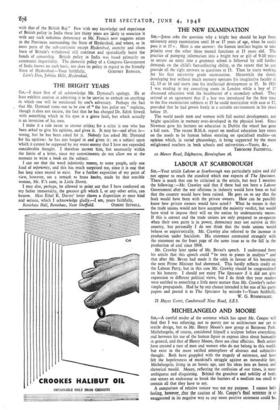THE NEW EXAMINATION
Sitt,—Janus asks the question why a bright boy should be kept from university entry examination until 16 or 17 years of age, when he could pass it at 15+. Here is one answer : the human intellect begins to take priority over the other three mental functions at 15 years old. The practice of pumping information into a bright boy or girl of 9-10 years to secure an entry inter a grammar school is followed by still further demands on the child's fact-collecting ability, to the extent that he can provide all the right answers to questions at 15. Then he starts working for his first university grade examination. Meanwhile the slowly developing boy without much memory operates his imaginative faculty at 12, 13 or 14 and starts into his intellectual development at 15. In 1928 I was reading in my consulting room in London while a boy of 17 discussed education with the headmaster of a secondary school. They arrived at an agreement that if a boy was introduced for the first time to the five examination subjects at 15 he could matriculate with ease at 17, provided that he had grown freely in a suitable environment in his years before 15. • The world needs men and women with full mental development, not bright specialists in memory over-developed in the physical level. Since Newman gave his lectures on education in Dublin the wheel has gone a full turn. The recent B.M.A. report on medical education lays stress on the needs to be human before entering on specialised studies--an opinion which, in varied phraseology, is being supported by the more enlightened teachers in both schools and universities.—Yours, &c., TO Manor Road, Edgbaston, Birmingham r6.
THEODORE FAITHFULL.


































 Previous page
Previous page